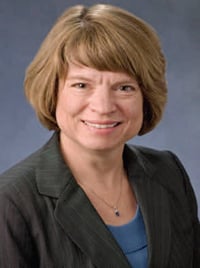 When the results of an NIH-commissioned study that revealed significant gaps in NIH funding for black researchers were first published in 2011, the disturbing findings quickly made their way around academic circles. Deborah Plummer, PhD, vice chancellor for human resources and diversity, said her email box filled up with notes from colleagues and friends alarmed by the findings and eager to find ways to eliminate them. Jean King, MD, vice chair and professor of psychiatry, remembers a similar flood of emails from colleagues. Both spoke about the experience when introducing speaker Donna K. Ginther, PhD, professor of economics at the University of Kansas, who came to UMMS on Sept. 28 to present “NIH Funding: Expanding Participation in Biomedical Research,” as part of the UMMS Diversity and Inclusion Speaker Series.
When the results of an NIH-commissioned study that revealed significant gaps in NIH funding for black researchers were first published in 2011, the disturbing findings quickly made their way around academic circles. Deborah Plummer, PhD, vice chancellor for human resources and diversity, said her email box filled up with notes from colleagues and friends alarmed by the findings and eager to find ways to eliminate them. Jean King, MD, vice chair and professor of psychiatry, remembers a similar flood of emails from colleagues. Both spoke about the experience when introducing speaker Donna K. Ginther, PhD, professor of economics at the University of Kansas, who came to UMMS on Sept. 28 to present “NIH Funding: Expanding Participation in Biomedical Research,” as part of the UMMS Diversity and Inclusion Speaker Series.
Dr. Ginther was first author on the study that NIH initiated to determine if researchers of different races and ethnicities with similar research records and affiliations had similar likelihoods of being awarded new NIH research project grants known as R01. It found that typical measures of scientific achievement don’t result in the same level of success for black applicants.
In an effort to understand the NIH results and develop strategies to support black researchers at UMMS who are seeking NIH funding, UMMS invited the study’s lead author to campus to talk about how the research was structured and to elaborate on the results, as well as shed light on how NIH might change the funding environment to eliminate disparities.
Terence R. Flotte, MD, the Celia and Isaac Haidak Professor of Medicine, executive deputy chancellor, provost, dean of the School of Medicine, noted in opening remarks at the talk, that as a public university, this institution is not fulfilling its mission if the workforce isn’t reflective of the population. “We’re thrilled to learn from Dr. Ginther and hope that this will be the beginning of an ongoing conversation,” he said.
In a detailed presentation, Ginther explained how the study controlled for variables ranging from education and citizenship to training and prior research awards. RO1 funding success for other minorities did not differ significantly from white applicants.
While the researchers didn’t identify a definitive conclusion for the why disparity exists, Ginther said that one possibility is that the quality of educational and mentoring experiences may differ for black or African American applicants. The study shows that researchers of all racial and ethnic backgrounds improve their award probability by taking part in NIH fellowship and traineeship programs, but these programs don’t significantly improve outcomes for black applicants. According to Ginther, this may mean that current NIH training programs do not equally benefit all racial and ethnic groups. “The NIH really needs to look at the training programs,” she said.
Another possibility that the research suggests, said Ginther, is conscious or unconscious bias in the grant proposal review process. Though the applicant’s race and ethnicity is not made available to reviewers, other personal information such as name or institutional affiliation can hint at the applicant’s race or ethnicity, which may be triggering bias.
The NIH has also implemented the Early Career Review program in an effort to bring young investigators into the process earlier so that they become known to the larger scientific community. “Scientific communities are small,” said Ginther. “If you’re known, you’re more likely to be funded.”
Another area that NIH will be exploring is how to improve support for grant applicants, since many proposals by first-time applicants are eliminated for technical errors without ever being reviewed for scientific merit.
“Strengthening mentoring and career preparation was a recommendation for increasing the diversity of the biomedical workforce that was emphasized in both the work of advisory committee [to the NIH director] and Dr. Ginther’s findings,” said King. “UMass Medical School is instituting several mentoring circles for faculty with the goals of decreasing isolation and improving access and networking with senior researchers and peers.”
The event was co-sponsored by the UMMS Diversity and Equal Opportunity Office, Center for Health Equity Intervention Research, Office of Research, Department of Psychiatry and Office of Faculty Affairs and was part of the UMMS Diversity and Inclusion Speaker Series.